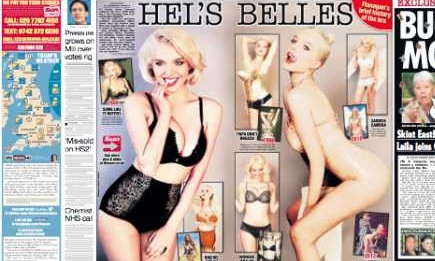
A new look to Page 3 (plus Page 2) in today's issue of The Sun
Could The Sun be on the verge of changing its mind about Page 3? Its editor, David Dinsmore, said today: "It is not set in stone that there must be a pair of breasts every day on Page 3."
His statement came on a day in which the paper ran a very different kind of Page 3 in which no nipples were displayed.
It came in answer to a question at a special breakfast with Dinsmore arranged by the London Press Club with more than 50 people in attendance, including many journalism students.
He had earlier pointed out, during an interview with the BBC's John Pienaar, that he stood by his decision to continue running pictures of topless women.
He said: "I make The Sun for its readers, not for the No More Page 3 people, or the Twitterati or Guardian readers. We held focus groups in which it was clear that we shouldn't touch it [Page 3]. People don't want to be told what should be in their newspaper."
Dinsmore said Page 3 was an "intrinsic part of the brand" and to remove it would therefore be "brand erosion." He added: "As far as I'm concerned I've parked the issue."
In an engaging and relaxed interview, followed by questions from the audience, Dinsmore tackled some of The Sun's unfortunate baggage.
On its notorious coverage of Hillsborough, for example, he conceded that a mistake had been made, but only over the headline ("The truth") and the then editor's decision to defend it and stick by it.
"I was still at school when it happened," he said. "Hardly anyone at The Sun now was there at the time." Despite that, he did not expect to sell more papers in Liverpool.
Pienaar spoke of The Sun's past "glory days" - when its front pages set the news agenda - and asked whether it had now "lost its mojo."
Dinsmore, who has been Sun editor for five months, did not think the paper had lost its magic. He pointed to two agenda-setting examples of his own: the day The Sun became The Son to welcome the birth of Prince George and its wrap-around to announce its paywall: "This is our Britain."
He pointed out that the media landscape had changed so much in recent years. Gone were the days of a few newspapers and a couple of TV channels. The Sun was now one among many, part of a multi-media explosion.
Now the paper has digital competitors, such as BuzzFeed, which he described as "brilliant - the best thing on the internet". Its content, "with a mix of light and shade", was "just like The Sun."
He was convinced that, despite falling print sales, his paper's content was "the subject of every conversation in Britain each day", even though people might not be conscious of it coming from The Sun because it was copied so quickly by other sites.
"People don't want news," he said, "they need it." He would not be drawn on how well, or not, The Sun's website has performed since it went behind a paywall (a word he didn't like).
"No-one knows the figures except us," he said. "We are trying to build a subscription membership business, which is different from our rivals who rely on a drive-by customers."
Pressed on whether the paper might have lost its empathy with its audience, Dinsmore said: "The first thing we ask ourselves is, 'is the reader going to be interested in this?'"
He spoke of "a sea-change in newspapers" where editors are now seeking to understand their readers, pointing to The Sun's appointment of a "data insight" editor.
What of the paper's politics? Dinsmore said there was now "clear blue water" between "leftist Labour and right-of-centre Conservatives." That was a clear hint of The Sun's likely backing for the Tories in the next general election but he denied that he had made up him mind. Let's wait until the next conference season, he said.
Dinsmore expressed concern at the current relationship between the press and police. "Having been too cosy, it has gone too far the other way," he said.
He also said: "It pains me every day that some of my colleagues have been treated [by the police] as they have been, with 5am raids. And, with notable exceptions, other papers stood by without comment on what happened to them."
He also addressed Plebgate, the incident which led to the resignation of chief whip, Andrew Mitchell, after The Sun splashed on a claim that he had called police "plebs". In spite of recent developments that have called the claim into question, Dinsmore said: "We stand by our original story."
But he was no fan of The Guardian's publication of NSA leaks by Edward Snowden, appearing to side with prime minister David Cameron in his criticisms.
Asked about his view of the articles, Dinsmore said: "I'm a little bit establishment on this. We have to protect ourselves. I would sleep more soundly in my bed knowing that our spies were monitoring emails."
0 comments Blogger 0 Facebook
Post a Comment